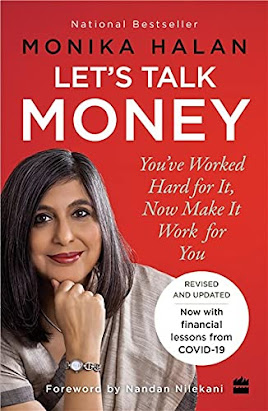Let's Talk Money: You've Worked Hard for It, Now Make It Work for You
Author- Monika Halan
Publisher- HarperBusiness
After March 24th, 2020, personal finance became a major topic of discussion in the country, especially among the middle class. Our society has low financial literacy, and historically, the most common financial decision made by families has been to invest in real estate, gold (usually in the form of ornaments), or fixed deposits. For years, we have neglected to improve our personal finance knowledge. However, personal finance and investment are not limited to just stocks and bonds. There are many other aspects that individuals must consider to achieve financial fulfillment, and this book provides guidance on those areas.
Monika Halan is a well-known expert in personal finance and provides practical tips and guidance for people to start looking into their personal finances. The foreword to the book by Nandan Nilekani adds credibility to the author's background in this area.
The book starts with a recently included chapter that speaks about the pandemic situation and provides guidance on how to handle financial crises. Monika's teaching style is excellent as she introduces the basics of personal finance and walks us through further investment and financial planning.
The book highlights the importance of an emergency fund, choosing insurance products, and helps us compare the best products in the market. While most middle-class families opt for endowment policies (preferably LIC), Monika advocates for term life insurance and provides a convincing rationale. For those choosing a medical insurance policy, this book will help you identify the right product.
The book debunks many financial myths, including the myth of investing in gold and real estate. The analogy used by Monika (I'm not sure if I remembered it correctly, but...)"If the roof above you belongs to you, then don't think of purchasing the second one" is spot on and provokes the inner sense of individuals. The myth of buying gold (as ornaments) is also proven wrong.
The common man often avoids financial topics because of the numbers involved. However, this book explains concepts from a practical perspective, with examples and minimal use of mathematics. The book covers a wide range of topics, including investment in mutual funds (a relatively large chapter) and post-retirement planning.
At the end of each chapter, the key points discussed are summarized as 4-5 bullet-points, making it easy to refer back to the book in the future. The language is simple and easy to understand for anyone who reads it. This is a must-read for every middle-class household, and it's important to pass on financial literacy to future generations.
~Dinesh

Comments
Post a Comment